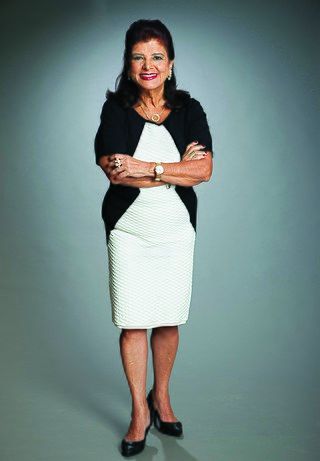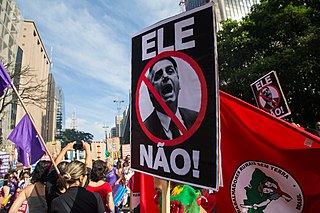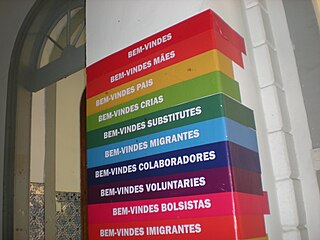
Fernanda G. Weiden is a Brazilian free software advocate and chief technology officer at VTEX. She has worked for Debian, Google and Facebook.

Fernanda G. Weiden is a Brazilian free software advocate and chief technology officer at VTEX. She has worked for Debian, Google and Facebook.
Fernanda Weiden was raised in Porto Alegre, Brazil. [1] She studied at Imperial College London and Anhembi Morumbi University. [2] She is married with two children and moved to Europe in 2019. [3]
Weiden first became involved with the Free software movement in 1997 and became an advocate for free software. [4] [1] In June 2003, Fernanda Weiden and Loimar Vianna founded Projeto Software Livre Mulheres. [5] [6] She was a sponsored Debian contributor; [4] [7] she was a member of Debian Women and participated until 2011. [8] [9] In 2004, she started a thread complaining about the prospective package hot-babe, which featured drawings of a girl undressing. [10] [11]
On 16 September 2006, Weiden participated in two panels at Wizards of OS 4 in Berlin; she was one of the speakers in The Future of Free Software, together with Atul Chitnis and Federico Heinz. [12] [13] The previous day, Larry Sanger announced Citizendium; [14] She was interviewed about the open source situation in Latin America. [1] At FISL 12, Weiden managed a course for women about system administration. [15] In FISL 15, she talked about failures in large-scale systems. [16]
Weiden worked for six years at Google and then moved to Facebook, where she grew to became director of Production Engineering. After seven years at Facebook, she joined Brazilian company Unico. [3] In September 2021, Weiden was promoted to the board of Unico, after previously being vice-president of engineering. [17] The following year, she became chief technology officer at VTEX. [2]

Workers' Cause Party is a political party in Brazil. Its origins can be traced back to 1978, when several Trotskyist activists who were not satisfied with the socialist international united under the name Tendência Trotskista do Brasil. However, the registered party was only established in 1995. Its electoral number is 29.

The Free Software Foundation (FSF) grants two annual awards. Since 1998, FSF has granted the award for Advancement of Free Software and since 2005, also the Free Software Award for Projects of Social Benefit.
Bilhete Único is the name of the São Paulo transportation contactless smart card system for fare control.
Domestic violence in Brazil involves any type of violence or abuse by intimate partners or family members against one another. The majority of domestic violence cases in Brazil are performed by the man against their female partners. In 2015, the government released a study that showed that every seven minutes a woman was a victim of domestic violence in Brazil, over 70% of the Brazilian female population will suffer some kind of violence throughout their lifetime and 1 in every 4 women reports being a victim of psychological or physical violence. In 2017, Brazil had an estimate of 606 cases of violence and 164 cases of rape per day, over 60 thousand cases throughout the year. It is also estimated that only 10% of the cases are registered to the police. Although Brazil acknowledged that domestic violence was a problem in the 1940s, the Government has only acted upon it from 1980s onwards, with the creation of the Women Police Stations and later in 2006, with the publication of the Domestic Violence law.

Christiane Maria dos Santos Torloni is a Brazilian actress. She is the winner of numerous awards, including an APCA Award, two Prêmios Qualidade Brasil, and a Shell Award, as well as receiving nominations for a Grande Otelo and three Troféu Imprensas. She is one of the most renowned actresses in Brazilian television drama.

Anti-discrimination laws in Brazil are present in the Constitution of Brazil, in the labour law, in the child and adolescent law, in the ageing law, and in the penal code.

Fórum Internacional de Software Livre (FISL) is an event sponsored by Associação SoftwareLivre.org, a Brazilian NGO that, among other goals, seeks the promotion and adoption of free software. It takes place every year in Porto Alegre, the capital of Rio Grande do Sul.

Bruna Linzmeyer is a Brazilian actress also known for her LGBTQIA+ and feminist rights activism.

PureOS is a Linux distribution focusing on privacy and security, using the GNOME or KDE Plasma desktop environment. It is maintained by Purism for use in the company's Librem laptop computers as well as the Librem 5 smartphone.

Luiza Helena Trajano Inácio Rodrigues is a Brazilian billionaire businessperson. She is chair of the retailer Magazine Luiza and associated companies. In July 2020, Forbes noted that she was Brazil's wealthiest woman. Trajano is an advisory board member to both UNICEF Brazil and UNFPA Brazil, among other entities. In 2021 Luiza was listed by TIME magazine as one of the 100 most influential people in the world. She is a feminist. As of April 2022, her net worth was estimated at US$1.4 billion.

Paula Fernanda Ramos Amorim, is a Portuguese businesswoman, daughter of the businessman Américo Amorim. In 2016, she assumed the presidency of the board of directors of Galp Energia.

The #EleNãomovement, also known as the protests against Jair Bolsonaro, were demonstrations led by women which took place in several regions of Brazil and, with less intensity, in other countries. The main goal was to protest against Jair Bolsonaro and his presidential campaign. The protests, which occurred on September 29, 2018, were the most numerous protests by women in Brazil and the largest popular concentration during the 2018 Brazilian general election.

Marília Dias Mendonça was a Brazilian singer, songwriter and instrumentalist, posthumously recognized in Brazil as the Queen of Sofrência, a subgenre of sertanejo music, and has been recognized for her contribution to female empowerment by revolutionizing the universe of sertanejo music.

Vitória Pais Freire de Andrade was an active Portuguese feminist who played an important role in the Conselho Nacional das Mulheres Portuguesas in the 1920s. She is also known for her campaigning against bullfighting in Portugal.

Beatriz Arnut, was a Portuguese writer, poet, civil servant and defender of women's rights.
Fernanda Staniscuaski is a Brazilian biologist, with a PhD on molecular biology and biotechnology. Staniscuaski currently holds an associate professor position at the Universidade Federal do Rio Grande do Sul. She founded the Parent in Science Movement, aimed at supporting researchers in the challenging conciliation of motherhood and academia, as well as promoting public policies to increase the participation and retention of women in STEM.

Gender-neutral language in Portuguese is a recent strand of demands for greater gender equality and social inclusion between men, women and non-binary individuals. It can be divided into inclusive or non-sexist language, and non-binary or neuter language or neolanguage. Inclusive language aims to use existing words to include all genders, while neuter language uses new or modified words to accomplish this.

Maria Christina Lima Corrêa da Rocha, best known as Christina Rocha is a Brazilian journalist and TV presenter. Between May 2009 and March 2023, she was the host of the program Casos de Família, on SBT. Today, she is presenter of the news program Tá na Hora and she was the creator of the podcast Christina PodTudo, on YouTube.
Márcia de Campos Pereira is a Brazilian activist who since the 1970s has fought for improvements in citizen's democratic rights, especially those for women. In particular, she helped to organize the Brazilian Democratic Movement, including its women's branch, and has participated in various Brazilian unions and women's organizations. In 2008, she became a member of the Conselho Nacional dos Direitos da Mulher. At its 2007 Beirut congress, the Women's International Democratic Federation (WIDF) elected Campos as its president. She was re-elected WIDF president at the 2007 Caracas congress in 2007 and again at the 2012 congress in Brasilia.